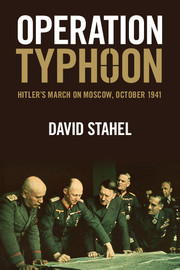Book contents
- Frontmatter
- Contents
- List of illustrations
- List of maps
- List of tables
- Acknowledgements
- Glossary
- Tables of military ranks and army structures
- Introduction
- 1 Contextualising Barbarossa
- 2 Operation Typhoon
- 3 Viaz'ma and Briansk
- 4 Carnage on the road to Moscow
- 5 Bock's final triumph
- 6 Exploiting the breach
- 7 Weathering the storm
- 8 Running on empty
- 9 The eye of the storm
- Conclusion
- Notes
- Bibliography
- Index
3 - Viaz'ma and Briansk
Published online by Cambridge University Press: 05 March 2013
- Frontmatter
- Contents
- List of illustrations
- List of maps
- List of tables
- Acknowledgements
- Glossary
- Tables of military ranks and army structures
- Introduction
- 1 Contextualising Barbarossa
- 2 Operation Typhoon
- 3 Viaz'ma and Briansk
- 4 Carnage on the road to Moscow
- 5 Bock's final triumph
- 6 Exploiting the breach
- 7 Weathering the storm
- 8 Running on empty
- 9 The eye of the storm
- Conclusion
- Notes
- Bibliography
- Index
Summary
Seeing which way the wind blows – Typhoon's zenith
While Bock had had his differences of opinion with his army commanders, at Army Group South Stülpnagel, the commander of the Seventeenth Army, was relieved of his command on 5 October after a clash with Rundstedt that drew in the OKH. Officially Stülpnagel departed because of sickness, but as Halder noted: ‘This sickness is as a result of the pressure exerted on him because of his timid leadership.’ Stülpnagel's leadership was viewed as insufficiently aggressive and by early October the point was reached where Rundstedt took command of the northern wing of the Seventeenth Army out of Stülpnagel's hands in order to push it forward again. Yet Stülpnagel's relief had an immediate impact on Bock's operations.
At his previous performance assessment in early 1941, Hoth had been favourably evaluated by Field Marshal Leeb, commanding Army Group North. Leeb had noted Hoth's characteristics as: ‘intelligent, deliberate, good mind for operational questions, leads very well’. Hoth was fluent in Russian and had recent experience commanding Strauss's Ninth Army during the defensive crisis on Bock's front in late August and early September. Indeed on his assessment form Leeb had written that Hoth was ‘Suitable as an army commander’. Thus, orders arrived from the OKH appointing Hoth as the Seventeenth Army's new commander. In spite of the fact that command of an army was viewed as a promotion, Hoth expressed a desire to remain at the head of Panzer Group 3 and Bock noted in his diary that he was ‘loath to lose this outstanding armoured commander’. Nevertheless, on 9 October Hoth departed for Army Group South and was replaced at Panzer Group 3 by General of Panzer Troops Georg-Hans Reinhardt, who had been the commander of the XXXXI Panzer Corps (see Illustration 4). Reinhardt had himself been positively appraised at an earlier review by Kluge who determined the panzer commander to be ‘very intelligent and thoroughly educated’. He also commended Reinhardt for his cool disposition in critical situations, a trait which would serve him well in the coming weeks of his new appointment.
- Type
- Chapter
- Information
- Operation TyphoonHitler's March on Moscow, October 1941, pp. 84 - 110Publisher: Cambridge University PressPrint publication year: 2013



